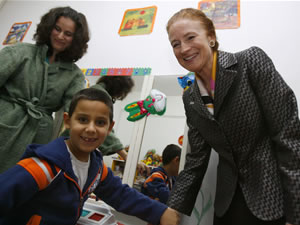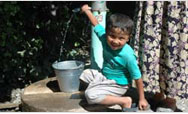USAID Welcomes Bulgaria, Romania as Sustaining Partners
USAID marked the culmination of 17 years of direct U.S. foreign assistance to Romania and Bulgaria. Croatia will hold its close-out ceremony in April 2008. The three countries, now members of the European Union and NATO, have achieved key development milestones politically, economically, and socially demonstrating their capacity to sustain their progress and transition from aid recipient to emerging donor.
Acting USAID Administrator Henrietta H. Fore traveled to Bulgaria and Romania to participate in closing ceremonies and observe the impact of U.S. assistance there.
“I am awed by what the Bulgarian and Romanian people have achieved in less than two decades, and look forward to the dawning of new partnerships that will further the exceptional progress that has been made with U.S. assistance,” she remarked.
Graduating countries is not new to USAID’s Bureau for Europe and Eurasia (E&E), which pioneered the close-out concept. Established with the signing of the 1989 Support for Eastern European Democracy (SEED) Act, the E&E Bureau was to provide what was initially envisioned as short-term support to aid 27 fledgling states and provinces formed with the fall of the Berlin Wall and collapse of the Soviet Union. As USAID moved into the region, the profound lack of capacity in terms of basic infrastructure coupled with a dearth of experience in democracy and the creation of a free-market economy signaled the need for more intensive development support.
Reforms took root quickly in the Baltic states and in the Northern Tier of Eastern Europe. By 2000, USAID graduated eight countries—Czech Republic, Estonia, Hungary, Latvia, Lithuania, Poland, Slovakia, and Slovenia—graduated from recipient status. In fact, several of these countries are now poised to share their own models of transition and are in the early stages of instituting their own foreign assistance programs. USAID has continued to cultivate
relationships to support its graduates in sustaining the momentum of progress, and, through its Regional Services Center in Hungary, has provided counsel and technical support to countries’ foreign affairs ministries and agencies as they begin mapping out their aid strategies.
With the second wave of mission closures to be completed by September 2008, the E&E Bureau is revisiting the phase-out process put into place by EUR/ACE in 2004. Under consideration are criteria that emphasize graduation to sustaining partnership status, rather than simply graduation from USAID assistance. Intended to more closely align criteria with Acting Administrator Fore’s goal of establishing sustainable partnerships through foreign aid and Secretary Rice’s vision for transformational diplomacy, this shift in emphasis is expected to create a more ambitious threshold for phase-out than the benchmarks set forth in the empirical Monitoring Country Progress system currently in effect.
Although a formal shift in criteria is just getting underway, much of the groundwork for strengthening recipient countries’ indigenous capacity to both maintain domestic progress and participate more fully in world affairs—as members of trade and treaty organizations, and as donors themselves—has already been laid in Bulgaria, Croatia, and Romania. In these countries, investment in partnerships with visionary leaders in the public, private, and non-governmental (NGO) sectors over the past 17 years have helped to expand democratic political processes, cultivate more vibrant civil societies, strengthen local government services, improve family health, implement much-needed social services, and deliver emergency relief in the wake of natural disaster.
USAID’s investment of more than $600 million in Bulgaria has had a substantial impact on reforms in the economy, judicial system, local governance, and other sectors. Key achievements have included the creation of “one stop shops” in municipalities to improve customer service to citizens, increased transparency of the courts, more than 50,000 loans to small businesses, and the creation of an estimated 130,000 jobs. U.S. partnership with Bulgaria will continue through the transition of the Bulgaria American Enterprise Fund into the America for Bulgaria Foundation, which is expected to be capitalized with more than $200 million dollars and will begin operation in 2008.
 |
Thanks to USAID, a former state-run, Romanian orphanage has been transformed into a modern child welfare center. Six-year-old Adi* (pictured with Assistant Administrator Fore) attends an on-site day care program which delivers a comprehensive complement of rehabilitative treatments.
*Not his real name |
Bulgaria’s Minister of State Administration and Administrative Reform, Nikolay Vassilev, credited USAID with advancing innovative approaches for fostering economic growth. “Some of the things that you’ve done for us cannot be measured in amounts of money, in numbers,” he explained. “Rather they relate to the spirit of entrepreneurship, to the spirit of reforms, of new ideas or policies. For us, privatization, public-private partnerships, concessions would have been more difficult without the constant help, and without the ideology of people like [those] at USAID.”
In Romania, USAID worked with local and national government, the Romanian Orthodox Church, NGOs and citizens to improve child welfare and reduce the number of children in orphanages from 170,000 in 1990 to 26,000 today. Specialized technical support has enabled Romania to rise to 48th for ease of doing business in World Bank rankings, while the Romanian American Enterprise Fund, established with a grant from USAID, has helped attract over $200 million in foreign investment. The Fund plans to use the profits from its investments to establish a new foundation that will finance innovative educational programs aimed at fostering further private sector development in Romania. Further, the recently signed $10 million grant for the German Marshall Fund’s Black Sea Trust for Regional Cooperation, to be based in Bucharest, marks the beginning of a new, 10-year partnership among the U.S., Romania, the German Marshall Fund, the Charles Stewart Mott Foundation, and other donors to strengthen cross-border ties, civic participation, democratic governance, and rule of law in Romania and across the Black Sea region.
Romanian Minister of Foreign Affairs Adrian Cioroianu, who attended the closing ceremony in Sofia, expressed appreciation for U.S. support. ”Through our collaboration with USAID, we not only benefited from assistance, but, in a special way, from the dedication and team work of USAID experts, who made a significant contribution to the program’s success,” he said.
Over the past 14 years, USAID’s investment of $320 million to Croatia has supported NGO sustainability, local government capacity-building, small and medium enterprise development, agriculture productivity, job creation, and private sector competitiveness. The formation of the National Competitiveness Council with public-private sector collaboration, and privatization of state-owned companies have generated over $132 million in revenues and $70 million in new investment commitments. USAID contributions to democratic reform include an improved legal framework for NGOs and the adoption of an automated financial and asset management system by 300 local governments which has identified and categorized $2.3 billion in assets and is now generating over $77.5 million in new revenues. Targeted “legacy” institutions will sustain and strengthen USAID investments, as the more than 4,000 citizens who have received professional training through USAID continue to boost productivity and innovation across Croatia’s sectors for years to come.
Even as these USAID missions prepare to close their doors in the coming months, it is clear that the U.S. and its emerging partners are exploring new opportunities together. In fact, the U.S. remains deeply invested in the evolution of enduring partnerships, particularly in these countries which serve as a cornerstone for stability and prosperity in Eastern Europe and Eurasia.
In her remarks at the closing ceremonies in Sofia and Bucharest, Acting Administrator Fore emphasized the importance of successful transition as “an invaluable model for nascent democracies everywhere” and committed to ongoing collaboration on promoting democracy and economic growth in the region.
Back to Top ^ |


